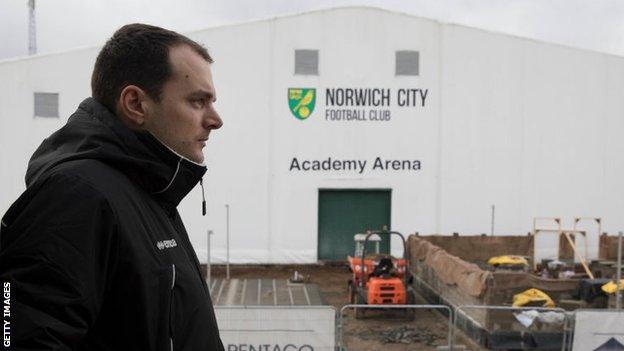Norwich sporting director Stuart Webber on the tricks of football recruitment
- Published

Norwich City sporting director Stuart Webber played a key role in Raheem Sterling's arrival at Liverpool
Teemu Pukki has made a blistering start to life in the Premier League - even surprising the man who signed him after several years of research.
"Did we expect 29 goals in a Championship-winning season? No that would be a lie. We don't try to pretend we're magical geniuses," Norwich City sporting director Stuart Webber told BBC Radio 5 Live's Euro Leagues podcast.
Having played a key role in taking Raheem Sterling to Liverpool, as well as uncovering the players that helped send both Huddersfield Town and Norwich to the Premier League, Webber is well versed in the tricks of player recruitment.
'Scouting has changed a lot'
"What people get caught up on is the idea of one person spotting or finding a player. It's much bigger than that," said Webber, appointed as Norwich's first sporting director in April 2017.
"Scouting has changed a lot, even since I started. If you look at the use of data now it's incredible what you can do."
Webber, 35, was headhunted by Liverpool as director of recruitment from Wrexham in 2009 and recalls the thorough process undertaken in monitoring the progress of current England and Manchester City forward Sterling.

Raheem Sterling joined Liverpool from QPR in February 2010 for an initial fee of £600,000
"I was fortunate enough to be a part of signing Raheem Sterling at Liverpool. We watched him constantly for 12 months in different environments - in the Queens Park Rangers youth teams and with England.
"I remember watching him play away in Belgium. He was a substitute, the pitch was frozen - it's still the coldest night of my life in football - and he came on and set up a goal.
"It's about gathering the information with your own eyes and reporting it accordingly."
More recently, Webber's meticulous approach saw striker Pukki sign from Celtic on a free transfer in June 2018 - before the Finnish international went on to terrorise Championship defences.
The arrival of Pukki at Norwich took "years of work" according to Webber - although he admitted he had wanted to sign the player much sooner.
"I first came across Pukki when he was at Schalke and I was at Wolves. I told our manager at the time, Stale Solbakken, that we could get him for about £1.2m and Stale liked the idea - but he got sacked two days later.
"Teemu then went to Celtic and we followed him over a period of time. When we saw he was coming out of contract, we looked at the goals he had scored and the chances we were creating and thought it could really work.
"He was watched for about five years, so we knew the type of player he was and how he would fit into how we play football."
Modern methods, similar results
Adapting to more modern methods have also brought reward for Webber and Norwich.
Currently, only Manchester City's Kevin de Bruyne boasts more assists than Canaries midfielder Emiliano Buendia in the Premier League this term.
But when Norwich discovered him, Getafe's Argentine was playing on loan at struggling Spanish second tier side Cultural Leonesa.
"If you look at now, we signed Buendia from the Spanish second division after he was flagged to us by the data," Webber said.
"The analysts flagged him because of the chances he was creating. His team were not scoring but we felt he would fit the way we play perfectly and we would score if he created those chances for us.
"His assists when we signed him were not high but his expected assists and number of big chances created were unbelievable high, we felt, for a 20-year-old."

Emiliano Buendia registered 11 assists for Norwich in the Championship last season, and already has four in eight games in the 2019-20 Premier League
Despite Leonesa eventually being relegated, Webber - who follows action from across Europe closely - would not be dissuaded from signing Buendia, a footballer he likens to former Norwich midfielder James Maddison.
And, although statistics and data hold an increasing influence in such decisions, sometimes a player just stands out.
"There is no better feeling than when you see a player for the first time who just grabs you," added Webber.
"The scouts showed me clips of Buendia for 20 minutes. Three minutes in they had my attention.
"I watched five games of him back to back that night. It was a dream to see how he played football."
Navigating difficult deals
Negotiations, however, are often not all plain sailing.
While attempting to secure Buendia, Webber travelled to meet the Getafe president with a budget significantly short of the La Liga side's initial evaluation.
Plotting his route to a favourable outcome, the Norwich sporting director took the bold decision to walk out of the meeting.
"You have different negotiations. Some are friendly - this one was awkward. It went back and to. In the end I just got up and said I was leaving.
"I just left the room. You could tell this would be a fight and we needed to fight back. All the foreign clubs think English clubs have stupid money - some do - but at Norwich we didn't.
"I knew they were desperate to do this deal. We could afford to leave it, we really wanted the player but it wasn't life or death. I went back home to Norwich and after a couple of days passed Getafe wanted to speak again.
"I drove to the airport but on my way I rang to tell the agent I was going to turn around. The president was much nicer, he knew I wouldn't be coming back again and we did the deal pretty quick, on the terms that we wanted."